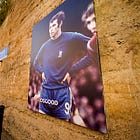Liverpool struggle to understand the yoof choosing Chelsea
Moises Caicedo and Romeo Lavia have only ever known the era of Chelsea dominance. Liverpool can't find their way out of the 80s.
Moises Caicedo was 12 years old and Romeo Lavia was 9 years old when Ted Lasso was introduced to the world, and Liverpool was introduced to Ted Lasso as "Used to be great, haven't won a title in a really long time."
If the Americans knew it, young footballers around the world knew it.
And if young footballers knew that Liverpool hadn't won a title in their lifetimes, and hadn't won any trophy since they were toddlers (Caicedo) or infants (Lavia), then they also knew that Chelsea won titles as a matter of course. Any time they looked across the Atlantic or across the Channel as they pursued their ambitions from the youth ranks to the U18s, they would see Chelsea lifting trophies. In their childhood years, they'd see Manchester United doing it on those occasions when the Blues didn't; and in their teen years, it would be Manchester City filling in as the regular non-Chelsea champion. And, during those impression forming years, if Caicedo and Lavia watched European competitions, if there was an English team they could count on in the finals, it was Chelsea.
Being a Liverpool partisan - paid or volitional - means thinking that history stopped in 1989. You know what I mean, and it ain't Francis Fukuyama.
But what I also mean is that Liverpool still operate as though they have the appeal and allure for young players that they did in 1989, when a teenager would associate the Reds with up to 10 First Division titles in their lifetime. From Jurgen Klopp up to the executives and down to the fans, Liverpudlians can't accept that Chelsea is more of a destination club for young players than theirs is. Liverpool FC's culture and identity are so wrapped around the 1980s that they are unable to understand that players born in the 2000s are attracted to the success they watched in the 2000s and 2010s: success that came home to Stamford Bridge, not Anfield.
"Plastic fans." "No history." "Chel$ki." If those pejoratives and lazy bantz ever had meaning, they've lost it, and they certainly never had it with footballers born in the early 2000s in non-England countries. Those footballers, along with anyone who has come into football since then, either by birth or by choice, have never known a world where Chelsea wasn't winning and Liverpool was. They've never known a world where Chelsea wasn't dominating the moment - on the pitch and in the headlines - and Liverpool wasn't trading on the past.
Tradition and history are beautiful and important parts of sport, particularly football. They're the reason we keep Kevin around.
They can help attract new fans, as some aspect of a team's past may resonate with someone getting to know the sport for the first time, and that quality gives them an early point of affinity and identification.
But they do not help attract new players. Players do not seek affinity. They follow ambition. Sometimes, affinity follows (e.g., Azpilicueta, Cesar).
A twist on the Lindy Effect gives us a reasonable predictor of a team's success over the coming X years: that team’s success over the preceding X years. A player who wants to optimize his career over the next 10-15 years will look to see who has had the most success over the last 15 years, and make those clubs the targets or totems of his ambition. That's not to say that any other club he signs with is just a stepping stone or take-what-you-can-get fallback. Simply that when one of those target clubs calls, he goes there with minimal hesitation. And when he can choose between a target club and any other, he's going to choose the target club.
Anyone who followed the Premier League for the last 10-15 years, or who crawls out from under a rock today and reviews the history of the last 10-15 years, is going to predict more success out of Chelsea than Liverpool for the next 10-15 years. That's the scale of a club's history that is relevant to players.
Obviously, this riff on the Lindy Effect ignores the discontinuities that can occur in a team's history, such as new ownership or the retirement of a dynastic coach or player. The 10-15 years for Chelsea before 2003 (Roman Abramovich buys), for Manchester City before 2008 (Sheikh Mansour buys) or Manchester United before 2013 (Sir Alex Ferguson retires) were not predictive of the subsequent 10-15 years.
Neither Liverpool's purchase in 2012 nor their hiring of Jurgen Klopp in 2016 have had such a discontinuous effect. Klopp has led the Reds to two major trophies: their first Champions League in 14 years, and then their first Premier League in 30 years. Two in six years does not a Lindy-breaking discontinuity make, not even if you add the domestic cups and the UEFA Super Cup. Not on the scale of their traditional rivals, Manchester United. Not on the scale of their rivals of the last few years, Manchester City. And not on the scale of their transfer market rivals, Chelsea FC.
That's not just a matter of money. At this level, the transfer market reflects the desires and ambitions of the players. Those were shaped over the last 10-15 years, the years in which those players were fans, aspirants and entry level professionals. They weren't shaped over the last four years when Liverpool managed to win a few things. Nor were they shaped 30-40 years ago, when those players' parents perhaps watched Liverpool win a lot.
Jurgen Klopp has perfected the look of bitter bafflement when things don't go his way. In this regard, he is the perfect representative of Liverpool FC.
The modified Lindy Effect tells us we'll get at least double his tenure of struggling Scousers. Struggling on the pitch, struggling on the transfer market and struggling to understand the already in motion wave of players who will choose Stamford Bridge.
Long may he reign in Red.
Photo credit: cfcunofficial / Flickr, under CC BY-SA 2.0.



